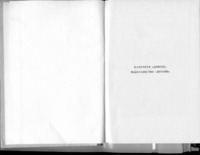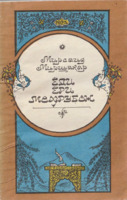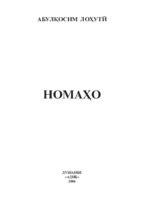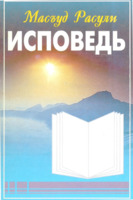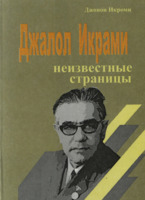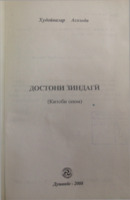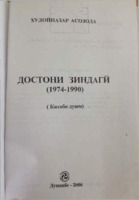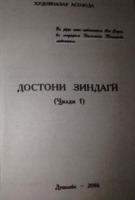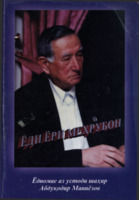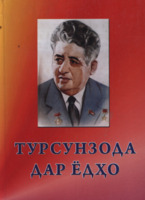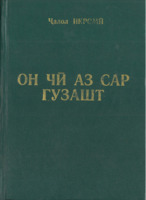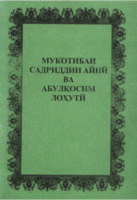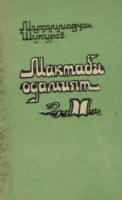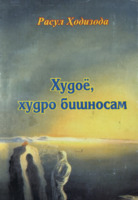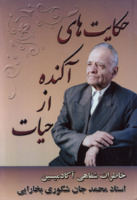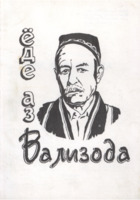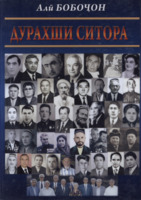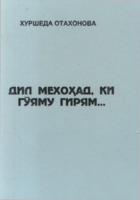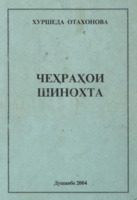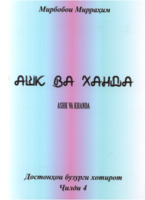Browse Documents (20 total)
Памяти Лахути In Memory of Lahuti
Abdulqosim Lahuti (1887-1957) was an Iranian/ Tajik writer. Forced to emigrate to the USSR for political reasons, he became a leading figure of Tajik letters and his works were translated into Russian and many other languages. This collection of essays about Lahuti's life and works was published in honour of Lahuti's posthumous 80th birthday, and includes works by Russian, Tajik, and other colleagues.
Ёди ёри мехрубон Memories of dear friends
From the publisher: Дар китоб хотира ва қайдҳои Шоири халқии Тоҷикистон, лауреати Мукофоти давлатӣ Мирсаид Миршакар аз ҳаёт ва эҷодиёти ходимони барҷастаи адабиёти советӣ гирд оварда шудааст.
Mirsaid Mirshakar (1912-1993) was a Soviet Tajik poet, writer, and government official. He was particularly known for his stories and poems for children, while his film work included Children of the Pamirs (1963). He was a member of the Central Committee of the Communist Party of Tajikistan, Chairman of the Supreme Soviet of the Tajik SSR (1961-1975), and chairman of the Tajik branch of Society for Solidarity with the Countries of Asia and Africa. This volumes includes reminiscences about other Tajik writers, among them Ayni, Lahuti, and Tursunzoda, as well as Russian writers like Kornei Chukovskii and Nikolai Tikhonov, and foreign writers such as the Punjabi novelist Gurbaksh Singh.
Номaҳо Letters
From the publisher: Ин китоб номаҳои то имрўз ба даст омадаи Абулќосим Лохутиро ба адибони тоҷик, ҳамдиёрон, дўстон, аҳли хонавода, хонандагон ва мухлисони ашъори ў дар бар кардааст. Номаҳо бо самимият, ҳарорати дил ва эҳтиром навишта шудаанд.
Abdulqosim Lahuti (1887-1957) was an Iranian/ Tajik writer. Forced to emigrate to the USSR for political reasons, he became a leading figure of Tajik letters and his works were translated into Russian and many other languages. This collection, assembled and annotated by Khursheda Otahonova, consists of letters written by Lahuti to writers in the USSR and abroad, including Sadriddin Ayni, Mirzo Tursunzoda, A. Dekhoti, and Romain Rolland.
Исповедь Confessions
Dr. Masud Rasuli (1925 - 1996) was an important Tajik and Uzbek literary scholar, who lived and worked in Samarkand and Tashkent, Uzbekistan. He worked as the Head of the Russian Literature Department of the Institute of Language and Literature at the Uzbekistan Academy of Sciences. These memoirs cover the majority of the Soviet period, including his childhood. The book offers an insight into Central Asia's reformist jadid movement, many members of which were repressed during the Stalinist period.
Джалол Икрами: Неизвестные страницы Jalol Ikrami: Unknown Pages
Jonon Ikrami (1936-) is a chemist and the son of writer Jalol Ikromi. In these memoirs he recounts episodes from the life of his father, the Tajik author Jalol Ikrami. The memoirs cover the authors’ childhood, the 1937 purges, and Jalol Ikrami’s relationship with other Soviet and Central Asian political and literary figures like Sharaf Rashidov, Habibullo Nazarov, Mukhtar Auezov, Mikhail Zand, and Marietta Shaginyan. The memoirs complement Jalol Ikrami’s own memoirs.
Достони зиндагӣ (қ 3.) Stories of life (volume 3)
From the publisher: Дар ҷилди сеюм «Достони зиндагӣ» хотираҳои давраи донишгоҳи муаллиф бо сабки равону дилчасп қаламдод шудаанд. Дар ин китоб хонанда бо воқеаҳои сиёсивӯ фарҳангӣ ва иҷтимоии даҳ соли охири асри XX ва як қатор чеҳраҳои хотирмони ин солҳои пурошӯб ошно мегардад.
H. Asozoda (1941-2014) was a prominent literary historian and educator who served two tours as an interpreter in Afghanistan. This is the third volume of H. Asozoda's three volume memoir. It covers the post-Soviet period and the civil war.
Достони зиндагӣ ( қ 2.) Stories of life (volume 2)
From the publisher: Китоби мазкур аз боба фаъолияти илмиву омӯзгории адабиётшинос профессор Х. Асозода солҳои 1974-1990 дар Донишгоҳи давлатии Тоҷикистон нақл намуда, доир ба ҳаёти илмиву фарҳангй ва адабии зшон маводи зиёди арзишмандеро дар бар мегирад. Китоб барои доираи васеи хонандагон, олимон, омӯзгорон, томбилмон ва ихлосмондани илму адаб пешниҳод мегардад.
H. Asozoda (1941-2014) was a prominent literary historian and educator who served two tours as an interpreter in Afghanistan. This is the second volume of H. Asozoda's three volume memoir. It covers the perios 1974-1990, when he worked at the State University in Dushanbe. Note that his service in Afghanistan is covered in two separate volumes available here.
Достони зиндагӣ (қ. 1) Stories of life
From the publisher: Доктори илмиу филология профессор X. Асозода дар ҷилди якуми китоби хотироти худ ҳаёти тифливу наврасӣ, солҳои донишчуи аввалин қадамҳои дар ҷодаи илму маориф гузоштаи хешро бо забони шево ба риштаи тасвир кашидааст. Мутолиаи китоб барои доираи восеи хонандогон алалхусус барои онҳое ки омузиши ҳаёт ва эҷодиёт чеҳраҳои шинохтаи фарҳангиро пешаи худ қарор доданд, судманд хоҳад буд.
H. Asozoda (1941-2014) was a prominent literary historian and educator who served two tours as an interpreter in Afghanistan. This is the first volume of H. Asozoda's three volume memoirs. It covers his childhood, schooling in Kulob, studies in Dushanbe, and his graduate work. It is particularly useful for its description of university life in the 1960s, and the perspective it offers on the contrast between life in more provincial cities and in the capital.
H. Asozoda (1941-2014) was a prominent literary historian and educator who served two tours as an interpreter in Afghanistan. This is the first volume of H. Asozoda's three volume memoirs. It covers his childhood, schooling in Kulob, studies in Dushanbe, and his graduate work. It is particularly useful for its description of university life in the 1960s, and the perspective it offers on the contrast between life in more provincial cities and in the capital.
Ёди Ёри Меҳрубон
(Ёдномае аз устоди шаҳир Абдуқодир Маниёзов)
Memory of a beloved friend (recollections about the great teacher Abduqodir Maniyozov)
From the publisher: Калами донишмандону фархехтагони тоҷик тааллук дорад ва онхо ба шинохам яке аз чехраҳои азиз ва мӯьтабари Тоҷикистон, фарзанди хирадманд, устоди донишманду ровии нотакрор, узви вобастаи Академиям илмхои Ҷумҳури Тоҷикистон, узви пайвасгаи Фарҳангистони забои ва адаби форсим Ҷумхурии Исломии Эрон, сарвари фахрии Пажӯҳишюхи забои ва адабиёги баноми Рӯдакии Академиям илмхои Ҷумхурии Тоҷикистон, раиси Кумитан иҷроияи «Пайванд» Абдукодир Маниёзов бахшида шудаанд. Муаллифон зимни хотирот ва аидепгарони аз бехтарин сифатҳои инсонй ва халокияг, озодкорй ва озодандешии ин озодмарди ҷомеа, чехраи инсонй ва шарофати азалии устоди зиндаёд. кобилияти ташкилогчигии илмй ва хислатҳои огмфаи рохбарй ва шеьршиносиву сухандонии ровии забони тоҷикӣ ёд овардаанд. Ҳамчунин дар китоб аз хотироту ёддошт, таълифот ва тарҷумаи бадей, ки аз шуглхои пайвасгаи устод Абдукодир Маниёзов буданд, ба хонандаи азиз як-ду намуна пешкаш мешавад. «Ёди ёри мехрубои» бо ташаббус ва сарпарастии Сафорати Ҷумҳурии Исломии Эрон дар Ҷумҳурии Тоҷикисгон, шахсан бо дасттирии Сафири Кабири Ҷумхурии Исломии Эрон дар Ҷумхурии Тоҷикистон, ҷаноби окои доктор Алиасгар Амири Шсърдӯст ба нашр расидааст.
Abduqodir Maniyozov (1930-2008) was a Tajik philologist. Maniyozov was among the first graduates of the State University in Stalinabad (Dushanbe); from 1972-2000 he was the Director of the Rudaki Institue of Language and Literature. Maniyozov was also the deputy editor of the Tajik Soviet Encyclopedia. This volume collects reminiscences from colleagues and writers, including Ali Bobojon, Horsheda Otahonova, and Ibrohim Usmonov. It also includes short sketches from Maniezov’s unfinished memoirs, covering his childhood during the Great Patriotic War.
Турсунзода дар ёдҳо Recollections about Tursunzoda
From the publisher: Мунодии сулҳу вассофи Ватан, шоири тавонову мураббии аҳли сухан ва яке аз муборизони фаьоли дӯстии халқхои олам Мирзо Турсунзода бо хислатхои наҷибонаю ашъори рангини хеш дар дили хамватанону хамкаламон абадан маскан гирифтааст. «Турсунзода дар ёдхо» дастагулест аз хотироти адибони бузурги олам ва дӯсзону аҳли қалам, ки ба муносибати 100-солагии ин сухансолори бузург пешкашатон мегардад.
Mirzo Tursunzoda (1911-1977) was a Tajik poet and writer, still recognized as one of the most important figures in 20th century Tajik literature. Many of his poems focused on anti-colonial themes. Tursunzoda held a number of important government posts, including chairman of the Soviet Committee for Solidarity with the Countries of Asia and Africa (SKSSAA), member of the Committee for Peace, chairman of the Union of Writers of the Tajik SSR, and a member of the Central Committee of the Communist Party of the Tajik SSR. This volume collects recollections from dozens of writers and colleagues, including Loiq Sherali, Aleksandr Dzasohov, Iosif Braginskiy, Gulnazar, and Rasul Gamzatov.
Mirzo Tursunzoda (1911-1977) was a Tajik poet and writer, still recognized as one of the most important figures in 20th century Tajik literature. Many of his poems focused on anti-colonial themes. Tursunzoda held a number of important government posts, including chairman of the Soviet Committee for Solidarity with the Countries of Asia and Africa (SKSSAA), member of the Committee for Peace, chairman of the Union of Writers of the Tajik SSR, and a member of the Central Committee of the Communist Party of the Tajik SSR. This volume collects recollections from dozens of writers and colleagues, including Loiq Sherali, Aleksandr Dzasohov, Iosif Braginskiy, Gulnazar, and Rasul Gamzatov.
Он чӣ аз саргузашт
The stuff of memoirs
From the publisher: Ин китоби охирини Ҷалол Икромӣ мебошад. Нависанда дар бораи солҳои наврасиаш, хешу табораш, революсияи сосиалистии Бухоро ва сарнагун шудани республикаи сосиалистии Бухоро, тараққиёт ва сабзиши республикаи сосиалистии Тоҷикистон сухан меронад. Саҳифаҳои зиёде ба солҳои мудҳиши 1937-39 бахшида шудааст.
Jalol Ikromi (1909-1993) was one of Soviet Tajikistan's most famous writers. This memoir covers his childhood in Bukhara as well his eventual move to Stalinabad (Dushanbe). A substantial portion of the memoir is devoted to the effect of the great terror on his own family and on the intelligentsia more generally. The final pages contain his reflections on Perestroika and the collapse of the USSR.
Мукотибаи Садриддин Айнӣ ва Абулқосим Лоҳутй. The correspondence of Sadriddin Ayni and Abdulqosem Lahuti
From the publisher: Ин китоб аз мактубҳои ду устоди бузург, Қаҳрамони Тоҷикистон Садриддин Айнӣ ва Абулқосим Лоҳутӣ фароҳам омадааст. Мактубҳо қимати илмиву адабӣ ва таърихӣ доранд.
This is a collection of correspondence between two of Soviet Tajikistan’s most prominent writers: Sadriddin Ayni (1878–1954) and Abdulqosim Lahuti (1887-1957). While both became part of the Tajik literary pantheon, neither had their primary residence in the republic. Ayni spent most of his life in Samarqand, while Lahuti lived in Moscow with his wife, Cecilia Bonu. These letters, held at the Archive of the Rudaki Institute of Literature in Dushanbe, were first published during the Soviet era. This second, more complete edition, includes additional letters from the period of the terror, when Ayni in particular was put under a great deal of pressure. The publication was prepared and edited by Khursheda Otahonova.
This is a collection of correspondence between two of Soviet Tajikistan’s most prominent writers: Sadriddin Ayni (1878–1954) and Abdulqosim Lahuti (1887-1957). While both became part of the Tajik literary pantheon, neither had their primary residence in the republic. Ayni spent most of his life in Samarqand, while Lahuti lived in Moscow with his wife, Cecilia Bonu. These letters, held at the Archive of the Rudaki Institute of Literature in Dushanbe, were first published during the Soviet era. This second, more complete edition, includes additional letters from the period of the terror, when Ayni in particular was put under a great deal of pressure. The publication was prepared and edited by Khursheda Otahonova.
Мактаби одамият: Баъзе масъалаҳои адабиёт
ва маънавият.
The School of humaneness: some questions of literature and spirituality
Muhammadjon Shakuri (Shakurov) (1924-2012) was a Tajik philologist and academician. He studied at the pedagogical institute in Dushanbe and later earned his kandidatskaia and doktorskaia degrees at the Institute of World Literature in Moscow. His professional home, however, remained the Rudaki Institute of Language and Literature in Dushanbe. In the late 1980s he became a leading figure in the campaign for the primacy of the Tajik language. This volume collects a number of his articles on the relationship between literature, spirituality, and morality. It also includes several pieces recounting experiences with Sadriddin Ayni, Mirzo Tursonzoda, A. Dehoti, and Mirsaid Mirshakar.
Худое, худро бишиносам To know oneself and to know God
From the publisher: Олим ва нависандаи маъруф Расул Ҳодизода дар китоби хотироташ ҳамзамон бо тасвири марҳилаҳои зиндаги ва фаъолияти худ дар бораи воқеахри таърихии илму маданият ва симохри шинохтаи адабиёт, илм ва фарх,анги тоҷик хркоятхри ҷолиб аз диду дили худ нақл намудааст. Чунонки муаллиф гуфтааст, ин китоб "еде аз саҳифаҳои таърихи замой ва одамон аст", ки 6а хонандаи имруз тақдим мешавад.
Rasul Hodizoda (1928-2010) was a writer, translator, and scholar. Born in Samarkand, he studied in Tashkent, worked briefly in radio, and later did graduate work in Moscow. Hodizoda spent most of his career at the Rudaki Institute in Dushanbe, but was also active in the Union of Writers and published in all-union publications such as Druzhba Narodov. These particularly detailed memoirs cover his childhood, education, and career. Hodizoda also provides detail on his experiences writing a novel about Ahmad Donish and his relationship with mentors like Sadriddin Ayni, Mikhail Andreev, and Aleksandr Semenov, as well as contemporaries like Muhamadjon Shakurov (Shakuri), Shavqat Niezi, Semen Lipkin, and Mikhail Zand.
حکایتها آکنده از حیات Stories full of life
Muhammadjon Shakuri (Shakurov) (1924-2012) was a Tajik philologist and academician. He studied at the pedagogical institute in Dushanbe and later earned his kandidatskaia and doktorskaia degrees at the Institute of World Literature in Moscow. His professional home, however, remained the Rudaki Institute of Language and Literature in Dushanbe. In the late 1980s he became a leading figure in the campaign for the primacy of the Tajik language. This volume, published in the Arabic/Persian script with the support of the Iranian Embassy in Dushanbe, includes accounts of raising Tajik-speaking children in a mixed family (his wife was Russian), his experience studying for a graduate degree, and his perestroika-era activism.
Ёде аз Вализода Memories of Valizoda
From the publisher: Дар китоб ёдномаҳое гирд оварда шудаанд, ки ба калами олимон, шоиру нависандагон, дӯстону наздикони Саидалй Вализода мутааллиқанд. Китоб оммаи хонандагонро ба хислатҳои наҷиби ин адиб ва ҳунарманди халқи тоҷик шинос намуда,, аз мақоми хоси шоир дар таърихи адабиёти шифоҳии халқи тоҷик ва эътирофу қадршиносии мардум иисбат ба фарзанди баруманди халқ нақл мекунад.
Saidali Valizoda (1900-1971) was a Tajik poet, musician, performer, and educator. After working at a theatre in Stalinabad he returned to Hovaling, his home district, in 1938, where he worked at a boarding school (internat). He continued writing and publishing in the decades after the Great Patriotic War. This volume collects recollections about Valizoda and poems written in his honor by writers like Boki Rahimzoda, Jolol Ikramov, Abdusalom Dekhoti, and others.
Saidali Valizoda (1900-1971) was a Tajik poet, musician, performer, and educator. After working at a theatre in Stalinabad he returned to Hovaling, his home district, in 1938, where he worked at a boarding school (internat). He continued writing and publishing in the decades after the Great Patriotic War. This volume collects recollections about Valizoda and poems written in his honor by writers like Boki Rahimzoda, Jolol Ikramov, Abdusalom Dekhoti, and others.
Дурахши ситора (очерк ва мақолаҳо). Shining stars: sketches and articles
From the publisher: Маҷмӯаро мавзӯъҳое фаро мегирад, ки дар онҳо касбу пешаҳои мухталиф дар мисоли рӯзгору фаъолияти соҳибистеъдодҳо, номварону номбардорони сарзамини аҷдодӣ ба қалам омада, аз як тараф, мутолеонро аз бисёр ҷиҳат ба гузаштаҳои пурифтихорамон мешиносонанд ва аз ҷониби дигар, дастури боэътимоде ҳастанд пайи ҳадафқои шойиста хддоях кардани хонандаи имрӯз.
A collection of the journalist Ali Bobojon's sketches and articles about Tajik artists and writers.
Дил мехоҳад, ки гӯяму гирям My heart wishes for me to speak and to weep
From the publisher: Ин китоб аз ду қисм иборат буда, қисми аввал «Дил мехоҳад, ки гӯяму гирям” ном дорад. Муаллиф дар он хотираҳои айёми тифлӣ ва ҷавснии худро рӯйи коғаз овардааст, ки ба воқеаҳои соли 1937 марбут аст. Селоби хунолудаи даврони сталинй оилаи ин зиёии тоҷикро низ ба гирдоби худ кашида буд. Муаллиф ҳодисаҳоеро ёдовар шудааст, ки падари ғамхору меҳрубон ва модари мискину бенавояш аз сар'гузаронидаанд..У дар симои модар тоқат, матонат, сидиу вафо ва покии дили як нафар зани ба фоҷиаи мудҳиш рӯбарӯшудаи тоҷикро таҷассум намудааст. Қисми дуюм аз хотираҳо ва очеркҳои илмию оммавӣ иборат буда, фаъолияти илмию адабии чеҳраҳои намоёни илму фарҳангро фаро гирифтаанд. Инҳо Мирзо Турсунзода, Носирҷон Маъсумй, Муҳаммад Осимӣ, Аҳрор Мухторов, Раҷаб Амонов ва дигарон мебошанд.
Khursheda Otakhonova was a Tajik literary historian, known in particular for her work on Abdulqassim Lahuti and Sadriddin Ayni. The first part of these memoirs, initially published in Sadoi Sharq,discusses the effect of Stalin’s purges on Otakhonova’s own family. Her father, Otahon Musohojaev, joined the Komsomol in 1919 and became a Party member in 1923; he was arrested in 1937. Hursheda and her mother sought shelter in Istarafshan; her father was released in 1944 but was not rehabilitated until 1957. Later chapters cover the author’s experience with prominent intellectuals and literary figures, including Abduqodir Manyezov and Mirzo Tursonzade.
Чеҳраҳои шинохта Familiar Faces
From the publisher: Дар ин китоб паҳлуҳои гуногуни эҷодиёти чанд тан аз адибони барҷастаи муосири тоҷик, аз ҷумла Зуфархон Ҷавҳари, Садриддин Айнӣ, Абулқосим Лоҳутӣ, Пайрав Сулаймонӣ, Мирзо Турсунзода, Раҳим Ҷалил, Мӯъмин Қаноат ва дигарон мавриди баррасӣ қарор гирифтааст.
Khursheda Otakhonova (1932-2016) was a Tajik literary historian, known in particular for her work on Abdulqassim Lahuti and Sadriddin Ayni. This volume collects a number of articles by Khursheda Otakhonova on Tajik writers like Sadriddin Ayni, A. Lahuti, Mirzo Tursunzoda, Sotim Ulughzoda, and others. The second half of volume includes her personal recollections about Mohammed Osimi, Tursunzoda, Abdullojon Gafforov, Habibullohon Saidmurodov, and Suhayli Javharizoda.
Ашк ва ханда
Love and laughter
From the publisher: Зиндагии инсон миёни талхиву ширищо сипарй мешавад ва шояд мо кам ба он таваҷҷӯҳ дорем ва на ҳама вақт ба қадри он мерасем. Дар ишрищои зиндагӣ ёде аз талхщост ва дар талхиҳои он намакест аз ширищо. Лаҳзаҳое, ки зиндагии ман ва хонаводаам ҳамчун ашк дар сари мижгон меистод ва ҳар дам номулоиматщо ва нохушояндщое дар як сарзамини дигар бар сари бандаи гариб таҳдид дошт, ба тасвири талхиву ширищои рузгор ва кори баргардони ҳикматҳо ва латифаҳои беҳтарини дунё пардохтам ва он душворщоро бо хандаҳои гиряолуд ороставу пироста сохтам.
Mirboboi Mirrahim (Mirbobo MIrrahimov) is a translator and expert in pre-Islamic religions. During perestroika, he became famous for his writings on the Tajik language and was one of the first writers to publicly discuss the status of Samarqand and Bukhara. He also became one of the cofounders of Rastokhez, Tajikistan's first independent political organization. This volume of his memoirs, however, covers earlier years in the 1970s and 1980s and describes his experiences at university in Dushanbe, interactions with Tajik poets, and commentary on other writers' works.
Mirboboi Mirrahim (Mirbobo MIrrahimov) is a translator and expert in pre-Islamic religions. During perestroika, he became famous for his writings on the Tajik language and was one of the first writers to publicly discuss the status of Samarqand and Bukhara. He also became one of the cofounders of Rastokhez, Tajikistan's first independent political organization. This volume of his memoirs, however, covers earlier years in the 1970s and 1980s and describes his experiences at university in Dushanbe, interactions with Tajik poets, and commentary on other writers' works.
